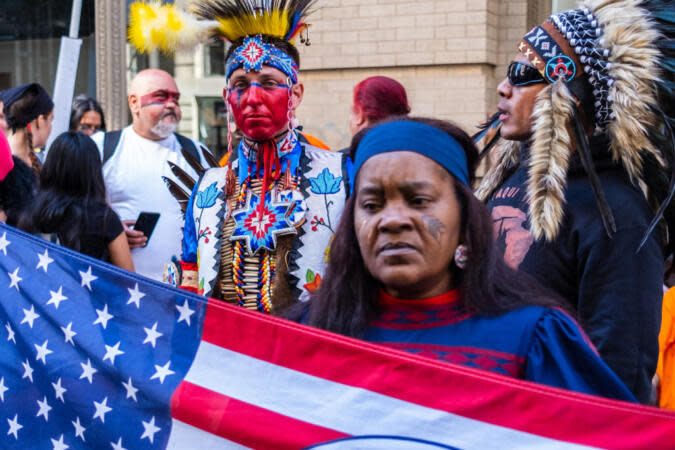Indigenous Peoples Day Continues To Become More Visible As The Columbus Day Alternative

- Oops!Something went wrong.Please try again later.
Monday marks the holiday traditionally known as Columbus Day in honor of Christopher Columbus’ voyage to the Americas, which put the Western Hemisphere on the map for Europeans. However, this day has increasingly been marked instead as Indigenous Peoples Day, a celebration of Native Americans who inhabited the land and endured hardships and early deaths following Columbus’ arrival.
Here are five reasons for this shift:
Columbus did not discover America.
The most obvious criticism of Columbus Day is that it celebrates something that didn’t happen. Columbus did not discover the Americas, two continents upon which millions lived. Nor did he initially think he had found something new, believing instead he had reached the East Indies, as Europeans called much of Asia. Thus, Columbus called the people he encountered “Indians,” a misnomer that stuck. And even among non-Indigenous people, Columbus was possibly not the first to reach the Americas, as Norse traveler Leif Erikson may have done so 500 years earlier, and voyagers from the ancient Phoenician civilization may have done so well before that.
Columbus implicated in slavery and sex trafficking
Christopher Columbus’ reputation has taken a hit in recent years, with widespread reports he actively led the murder and enslavement of Indigenous people on the lands he and his crew reached. Many of these reports focus on words recorded in Columbus’ journal and writings left by those who came to the Americas with him. Some of these documents are disputed; for example, Columbus’ journal only survives in copies that have potentially been mistranslated or misinterpreted over time. However, multiple historical sources confirm enslavement and sex trafficking conducted by Europeans under Columbus’ command, as he was indifferent to these acts at best.
Columbus’ “discovery” led to mass killing.
Regardless of Columbus’ intentions, his arrival led to the mass deaths of Indigenous people, a process that some have called genocide. The population of the Americas dropped from around 60 million people in 1492 to only 6 million a century later, a staggering 90% decline. These deaths resulted from both violence conducted by Europeans and the arrival of European diseases like influenza, measles and smallpox, which killed Indigenous Americans who had no natural immunity to these viruses.
Hostilities against Italian Americans have died down.
Although Columbus sailed on behalf of Spain, he was an Italian, and Columbus Day has been a significant celebration for Italian Americans. The holiday was primarily designed to combat anti-Italian prejudice and even violence in America. According to the Italian Cultural Society of Sacramento, President Benjamin Harrison declared Columbus Day a holiday in 1892. Although the date marked the 400th anniversary of Columbus’ first voyage to America, it was also one year after 11 Italian Americans were lynched in New Orleans; at the time, “Italian Americans were the second largest ethnic group to be lynched in the United States.” Columbus Day was implemented as a holiday to promote positive images and sentiments toward Italian immigrants and their descendants. Today, anti-Italian prejudice has largely subsided in the U.S., and the continued celebration of Italian American heritage on Columbus Day is weighed alongside recognition of Indigenous Americans who have faced violence, prejudice and exclusion.
Activism by Indigenous Americans and supporters
Indigenous Peoples Day came about after decades of activism by Native American rights advocates, who, in the 1960s, formed the Red Power Movement with inspiration from the Civil Rights Movement and Black Power. Furthermore, a 1977 United Nations conference recommended “an International Day of Solidarity with the Indigenous Peoples of the Americas.” South Dakota first celebrated “Native American Day” in 1990, and the city of Berkely first observed Indigenous Peoples Day two years later. Indigenous Peoples Day is not a federal holiday but is celebrated in 17 U.S. states and Washington, D.C. In 2021, Joe Biden became the first U.S. president to issue a declaration celebrating the holiday.
With awareness of the history of America’s first inhabitants and Indigenous Peoples Day’s gaining popularity, acknowledgment of the holiday is expected to grow over time. Though it may not replace Columbus Day, Indigenous Peoples Day seems set to join that holiday as the full impact of Columbus’ voyages is finally recognized.

